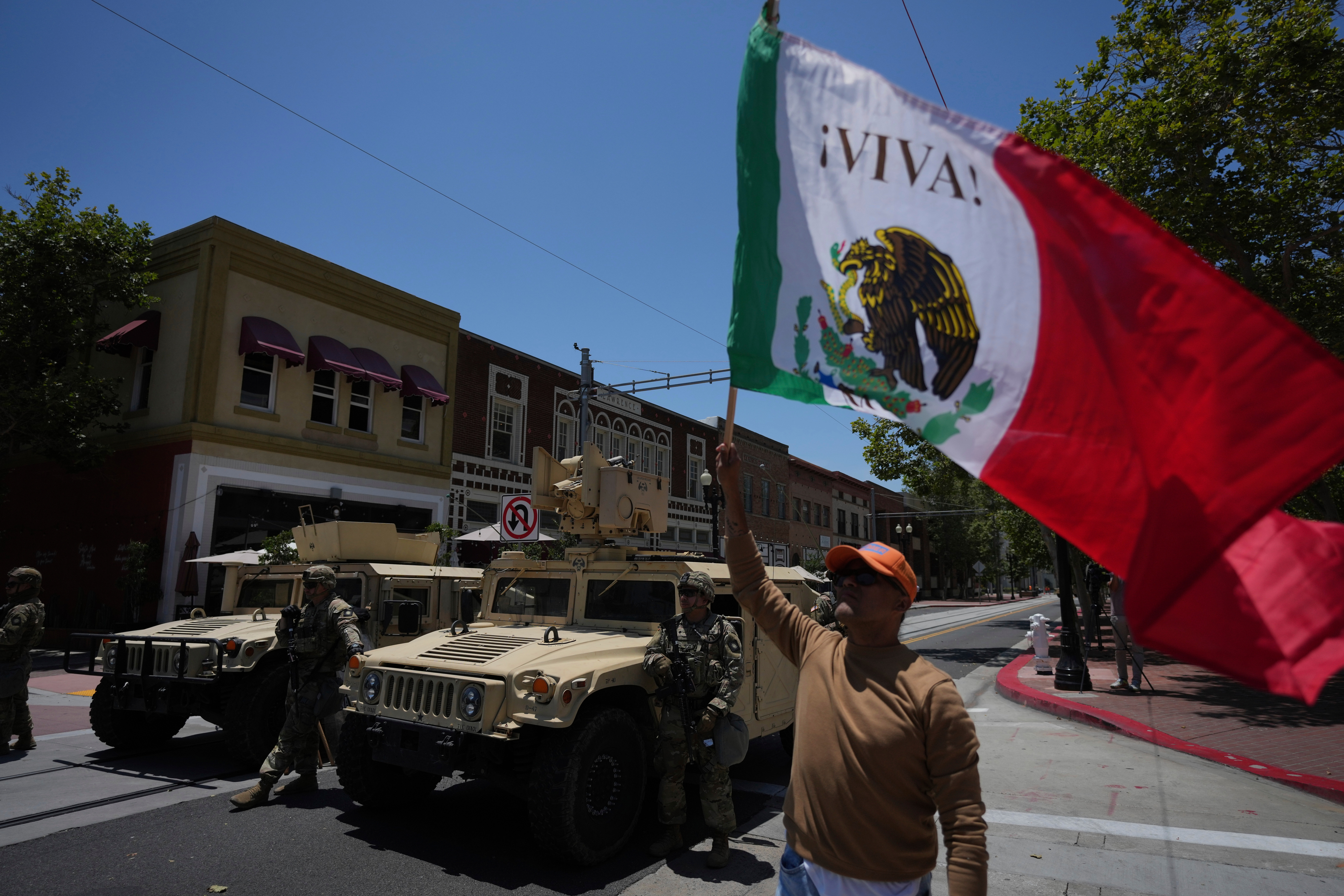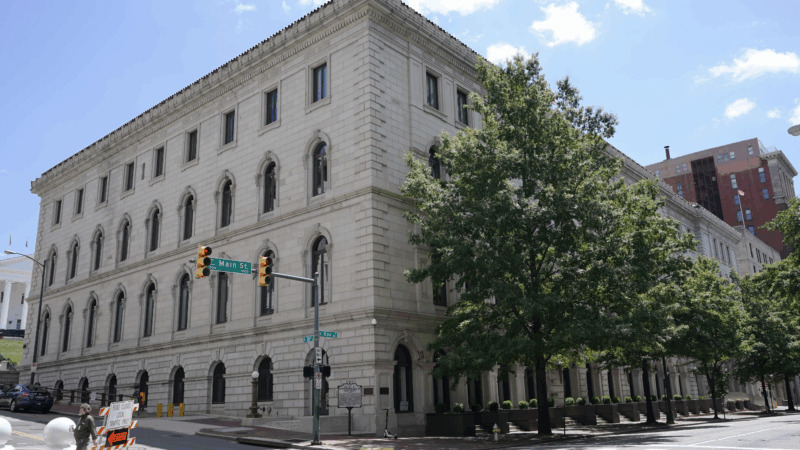LA braces for Marines as California sues to stop military involvement
Downtown Los Angeles was quieter Wednesday morning as it emerged from its first overnight curfew since the start of protests against immigration enforcement raids. The city imposed the curfew after incidents of looting and vandalism on Monday. LA Police say 203 people were arrested for failing to disperse, another 17 for curfew violations, as well as a few other charges.
Still unclear to city leaders, though, is what role the military will play. President Trump federalized 4,000 National Guard troops over the objection of California Gov. Gavin Newsom, and also sent in 700 Marines.
Defense Secretary Pete Hegseth defended the decision to send in troops, saying they were necessary for “maintaining law and order.”
But experts in the laws governing the use of the military say the federalized National Guard and active-duty military, such as the Marines, can’t act as police.
“For sure, they can’t arrest,” says William Banks, a Syracuse University professor who’s written extensively on the question. He says the Posse Comitatus law of 1878 limits the use of the military inside the U.S.
“Even when the Guard are federalized by the President, no matter how he puts it, they can protect the federal property and the federal personnel, but they can’t enforce the law at all,” he says.
There could be an exception to this restriction, if the President were to invoke the Insurrection Act of 1807, as President George H.W. Bush did in 1992, when he sent in Marines to help quell the Rodney King riots. But so far, President Trump has not taken that step.
In the meantime, the 700 Marines are reportedly not yet in LA. In a video posted by ABC News, Maj. Gen. Scott Sherman, who is overseeing the operation, said they’re at Naval Weapons Station Seal Beach in Orange County, where they’re getting civil disturbance training.
A major difference between what’s happening now and the riots of 1992 is that this time, local and state officials didn’t request the military’s help. California has asked a federal court to block the government from using troops in LA outside of federal property. LA Mayor Karen Bass said Tuesday night that she doesn’t know what the Marines’ role will be.
“Who knows? The bottom line is, we’re not told,” Bass said. “Basically we have to operate on rumor. So rumor has it, there are 700 Marines that are going to come here. I have no idea what they’re going to do when they get here.”
ICE posted photos that appeared to show National Guard members protecting ICE agents in the field on Tuesday. Some National Guard members Wednesday have temporarily detained civilians in Los Angeles, according to The Associated Press, handing them over to law enforcement.
Some legal experts say this could fall under the Guard’s role protecting federal employees. But if they’re drawn into directly aiding immigration enforcement, they risk violating Posse Comitatus.
But not all federal-local relationships are under strain. On Wednesday morning, the U.S. Attorney for the Central District of California, Bill Essayli, announced federal charges against two men for possessing molotov cocktails during protests in Paramount, Calif., and LA. He praised local police and the LA sheriff’s department for their help in the investigation, and local law enforcement representatives at the press conference also thanked the feds.
“We have a very good relationship with our law enforcement partners,” Essayli said. At the same time, he stressed the fact that federal law enforcement would not be bound by state restrictions on immigration enforcement.
“Some people apparently have the notion that California really is a sanctuary from federal immigration laws,” Essayli said. “Federal laws are applicable here and they will be enforced, and nothing they have done to date has impacted our ability to carry out our immigration enforcement efforts.”
Transcript:
A MARTÍNEZ, HOST:
Downtown Los Angeles was under curfew last night for the first time since anti-ICE protests began on Friday.
MICHEL MARTIN, HOST:
City officials said the protests have been largely peaceful, but instances of vandalism and looting led them to implement the curfew. Meanwhile, the Trump administration has moved ahead with the deployment of Marines and more National Guard over the objections of state and city leaders.
MARTÍNEZ: Joining us now to talk about the military’s role in Los Angeles is NPR’s Martin Kaste. So, Martin, the National Guard arrived over the weekend. Marines are now in the city, though we don’t yet know where they’ll be. Is it clear what their mission is?
MARTIN KASTE, BYLINE: Well, the administration says they’re there to protect federal facilities and employees. And we’ve seen some of that, you know, the row of National Guard with shields standing there as a human barrier in front of federal buildings. There have also been reports, though, of the guard protecting ICE agents out in the field as they do their jobs, and that could put some of those soldiers into more dynamic situations that might start to look a little bit like they’re part of enforcement.
MARTÍNEZ: OK. Would they be allowed to do that, to assist ICE directly with its enforcement work?
KASTE: The experts say no because of a 19th century law known as Posse Comitatus, which bars the military from acting as police inside the country. I asked William Banks about this. He’s a professor at Syracuse University, and he’s been studying this very question about what’s legal for the military inside the country for years.
WILLIAM BANKS: For sure they can’t arrest. If the crowds are trying to push through them or throwing rocks at their face or something like that, they could protect themselves. That’s federal protection. But they can’t enforce the law.
MARTÍNEZ: OK. So he says the military isn’t supposed to do law enforcement, but they have been deployed inside the country over the years. I mean, I remember back in 1992, right here in Los Angeles, where I’m at, during the Rodney King riots. I mean, how is this military deployment different?
KASTE: Legally, the difference is that in ’92, President George H.W. Bush invoked the Insurrection Act, which allows for the use of the active military to quell civil disturbances. But maybe just as important here is the difference that this time around, the state and local authorities don’t want the military’s help, and they don’t know what to expect from the military now that they’re here. And you can hear that frustration in the voice of LA Mayor Karen Bass. This is her last night when someone asked her, what are the Marines doing?
(SOUNDBITE OF ARCHIVED RECORDING)
KAREN BASS: Who knows? I mean, the bottom line is that we’re not told. Basically, we have to operate on rumors.
KASTE: And, you know, this is really unusual. Normally, you’d have the military plugged into the local emergency management system, coordinating with the police.
MARTÍNEZ: So what happens then if, say, the National Guard and/or the Marines get into a situation that requires force? I mean, how prepared is the military to use force against American civilians?
KASTE: The National Guard get crowd control training, and they have some of the gear, such as those shields. As to the Marines, well, I talked to Mick Wagoner. He’s a retired Marine Corps lieutenant colonel who focused on military law, and he said there are some Marines who get specialized training for missions such as evacuating U.S. embassies that are threatened by crowds. But he said that’s just not the same as police work. And he recalled an infamous case during the ’92 riots in LA, when the police asked some Marines to cover them as they approached the house.
MICK WAGONER: And the Marines then lay down suppressing fire. The police were completely aghast. What are you doing? You said to cover you. It’s like, yeah, tell us if somebody sticks their head out or if you see a gun or something, but, Jesus, you just lit up that house.
KASTE: Wagoner says that case shows just how differently the police and military approach things and even understand basic words like cover me. And he says he really hopes that these Marines in LA now will be kept in the rear behind the National Guard because at least some of them may be police officers in their day jobs and may have more training for crowds.
MARTÍNEZ: All right, that’s NPR’s Martin Kaste. Thanks a lot, Martin.
KASTE: You’re welcome.
Federal judge acknowledges ‘abusive workplace’ in court order
The order did not identify the judge in question but two sources familiar with the process told NPR it is U.S. District Judge Lydia Kay Griggsby, a Biden appointee.
Top 5 takeaways from the House immigration oversight hearing
The hearing underscored how deeply divided Republicans and Democrats remain on top-level changes to immigration enforcement in the wake of the shootings of two U.S. citizens.
Snowboarder Chloe Kim is chasing an Olympic gold three-peat with a torn labrum
At 25, Chloe Kim could become the first halfpipe snowboarder to win three consecutive Olympic golds.
Pakistan-Afghanistan border closures paralyze trade along a key route
Trucks have been stuck at the closed border since October. Both countries are facing economic losses with no end in sight. The Taliban also banned all Pakistani pharmaceutical imports to Afghanistan.
Malinowski concedes to Mejia in Democratic House special primary in New Jersey
With the race still too close to call, former congressman Tom Malinowski conceded to challenger Analilia Mejia in a Democratic primary to replace the seat vacated by New Jersey Gov. Mikie Sherrill.
A daughter reexamines her own family story in ‘The Mixed Marriage Project’
Dorothy Roberts' parents, a white anthropologist and a Black woman from Jamaica, spent years interviewing interracial couples in Chicago. Her memoir draws from their records.






